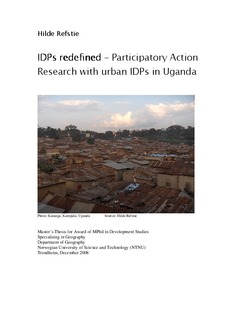| dc.contributor.author | Refstie, Hilde | nb_NO |
| dc.date.accessioned | 2014-12-19T14:25:44Z | |
| dc.date.available | 2014-12-19T14:25:44Z | |
| dc.date.created | 2009-01-19 | nb_NO |
| dc.date.issued | 2008 | nb_NO |
| dc.identifier | 134244 | nb_NO |
| dc.identifier.uri | http://hdl.handle.net/11250/265284 | |
| dc.description.abstract | This dissertation investigates the discourse on Internally Displaced Persons (IDPs) in Uganda and how IDPs in urban areas fit in to the discourse on both the theoretical and practical level. The dissertation reveals that although IDPs in urban areas by definition are included in both international and national IDP definitions, urban IDPs are seen as either economic migrants, or as former IDPs who have now reached a durable solution. The consequences of such exclusion from the IDP label are that IDPs outside camps are not considered for assistance or included in the return and resettlement frameworks or information activities.
The formation of the IDP label in Uganda has been influenced by the government’s approach of control and military presence aimed at keeping people in camps in the north. Consequently, IDPs are perceived entirely as people residing in camps. The humanitarian community has been complicit with the government’s policy of keeping people in camps by limiting assistance to IDPs registered and residing within them. The obvious lack of resources dedicated to protecting IDPs also influences the way the label is shaped. It is challenging to identify IDPs in an urban setting because of lack of registration and information. It is also difficult to determine who are forced migrants, and which of them have reached a durable solution. Consequently, IDPs in Uganda has in practice been redefined to those staying in camps.
Upon acknowledging how the voices of urban IDPs are marginalized within the dominant discourse, phase two of the fieldwork progressed towards influencing this discourse by revealing the political and bureaucratic agency in the processes of labelling creating greater awareness of the processes that serve to exclude urban IDPs from return and resettlement frameworks. By facilitating the mobilization of an urban IDP interest group I together with the community outreach organization Refugee Law Project worked together with urban IDP communities advocating for their rights. | nb_NO |
| dc.language | eng | nb_NO |
| dc.publisher | Norges teknisk-naturvitenskapelige universitet, Fakultet for samfunnsvitenskap og teknologiledelse, Geografisk institutt | nb_NO |
| dc.title | IDPs redefined – Participatory ActionResearch with urban IDPs in Uganda | nb_NO |
| dc.type | Master thesis | nb_NO |
| dc.contributor.department | Norges teknisk-naturvitenskapelige universitet, Fakultet for samfunnsvitenskap og teknologiledelse, Geografisk institutt | nb_NO |
